- Home
- Scott Mariani
The Sacred Sword bh-7 Page 24
The Sacred Sword bh-7 Read online
Page 24
This was his job. He was well paid for what he did, and he had the fine home in London and the enormous mortgage hanging around his neck to show for it, as well as his growing family and the impending responsibility of fatherhood to think of. Could he afford to take a gamble on how the Trimble Group would react if he spilled his concerns to them? He knew virtually nothing of their deeper agenda. Who would they most likely favour: an expendable, replaceable mid-ranking operative like Rex O’Neill, or the prize racehorse into whom they’d already invested millions?
O’Neill thought better of making the call. He put the phone away and went to see if he could rouse the drunken Steve Cutter.
Chapter Forty-Five
Ben and Jude had managed to beat the Christmas rush and snatch the only connecting rooms at the Golden Jerusalem hotel on Jaffa Road. The carpets were wearing thin in places, but Ben didn’t care and his room had a balcony overlooking Zion Square where he could smoke and watch the city. He resisted the mini-bar, convinced he could still feel the after-effects of Jacques Rabier’s moonshine dissolving his innards. After a quiet dinner in the hotel, during which Jude was very morose and reticent, Ben returned to his room, sat on the bed and used his phone to go online and check out the name Wesley Holland.
The simple addition of a surname was all it took to transform a completely obscure lead into a font of information; in fact a bewildering excess of it for Ben’s purposes. Holland was all over the internet, although by all accounts the man himself was notoriously camera-shy and somewhat given to reclusiveness. Of the hundreds of articles Ben came across, nearly all focused on the American’s wealth, with estimates of his personal worth veering between nine hundred million to over a billion and a half.
Wesley Bartholomew Holland had been born in a small town in rural Idaho during the Second World War, the only child of a hardware store manager and a schoolmistress, his mother having instilled in him a passion for history that had stayed with him all his life. His father had been one of so many U.S. Marines slaughtered as they came off the landing craft at Omaha beach, when Wesley was an infant. Raised by his devoted mother, the boy had grown up to be a brilliant young man with an uncanny knack for business, and gone on to make his first fortune in real estate. By the age of thirty, he’d become one of the richest men in America.
Wesley Holland was currently believed to have major business interests in more than sixty countries, in industries ranging from electronics to aviation to publishing and many more besides. He owned silver mines in Mexico and gold mines in Australia, copper mines in Chile, steel foundries in Japan. Pipelines, airlines, factories, private colleges, chain megastores. At one time he’d owned a Major League baseball team, though he had little interest in sport. Married four times, never successfully or for very long. In recent years, Holland’s passion for all things antiquated had inspired him to pour millions into the restoration of crumbling historic buildings, churches and cathedrals across the U.S.A. and Europe.
Ben thought about that. Was it possible Holland’s and Simeon’s paths had crossed with regard to a church restoration?
He read on. Holland had supported the arts, made gigantic donations to galleries and museums, rescued scores of formal gardens from the hands of developers. But most of all he was known for his vast and enormously valuable private collection of antique arms and armour, the fruit of a half-century-long love affair with the weaponry of bygone times, that had made him one of the world’s pre-eminent collectors of ancient swords.
Now Ben began to understand what connected the American to Simeon’s mysterious research. Had the sacred sword, whatever it was, in fact been Holland’s own discovery? That might account for the trips Simeon and Fabrice Lalique had taken to the States. But why had Holland shared it with two clergymen? Moreover, two who were from different branches of the church? How had Lalique become involved? And what about the Israeli connection? Maybe tomorrow’s meeting with Hillel Zada would answer those questions.
Tracking through recent articles on Holland, Ben finally came across the unfolding news story of the recent attack at his home, the Whitworth Mansion near Lake Ontario. He looked at photos of the enormous house and read every scrap he could find about the incident. Three members of Holland’s staff had been shot dead in what was believed to have been an attempted robbery by an armed gang, who had left apparently empty-handed after the billionaire had managed to escape to a panic room and call the police. Holland himself had disappeared shortly after the incident, and sources close to him had expressed great concern at the lack of contact from him since. It was not believed that Holland was under suspicion for the crimes committed at his home.
There had been two possible sightings of the billionaire soon after his disappearance, one from a freight trucker named Maynard Griggs who claimed to have picked up an elderly hitchhiker a few miles from the Massachusetts state line and only recognised him later from the television news; and one from a forty-seven-year-old waitress named Sally-Ann Ryerson who’d served coffee to a lone traveller closely matching Holland’s description at the diner where she worked outside Lunenburg, MA. The man had told her he was heading towards Boston, possibly by bus. No further sightings had been reported. The investigation was continuing.
Ben went on searching for more material.
*
Cutter, Grinnall, Mills and Doyle thundered up the stairs to the floor where the hotel manager had told them the foreigners were staying. The manager was now lying comatose on the floor of the office behind the lobby, bleeding profusely from a pistol-butt blow to the head. The old guy might have had a heart attack, they weren’t sure. He’d collapsed before they’d managed to get all the information out of him.
It was almost midnight. A busy few hours had gone by since the Trimble Group jet had touched down at the private terminal at Ben Gurion Airport. Cutter was under pressure to get results, and he wasn’t messing around. A few heads had been broken before one of the airport shuttle service minibus drivers had finally come up with something. Two foreigners answering Hope and Arundel’s descriptions had got off his bus in Jerusalem centre and been seen hailing a cab. At first the minibus driver couldn’t remember which taxi firm it had been, but it was amazing how a knife to the testicles focused the mind. From there, it had been a straightforward matter of bribing and brutalising as many people as it took until a taxi driver spat out the name of a hotel.
‘This is the floor,’ Cutter said as they emerged at the top of the stairs. He started off in long strides down the corridor. Grinnall walked a step behind, his leather coat swishing. At the rear, Mills and Doyle were deep in debate.
‘He’s fucking nuts, though, ain’t he? See it in his fucking eyes.’
‘That’s not the fucking point, though.’
‘Shut it,’ Cutter threw back over his shoulder, and the conversation ceased. Up ahead, a pretty, plump Israeli girl in a cleaner’s uniform emerged from an empty room carrying a mop and bucket. She was working very late tonight, and looked as weary as she felt. Her polite smile faded when she saw the looks on the four men’s faces. Before she could let out a scream, Grinnall clapped a hand over her mouth. ‘Take her in there,’ Cutter said softly, glancing up and down the corridor. They dragged her into the room and shut the door.
Inside the room, Grinnall kept his hand tightly over her mouth, clutching her head to his chest with a pistol at her temple. She squirmed and rolled her eyes in terror at the sight of the gun. He hadn’t had this much fun since plugging the motel reception girl back in America. It made up for the humiliation of losing Holland’s trail and returning empty-handed.
Cutter took out the photo prints he’d shown the manager downstairs. Hope’s was taken from his business website, Arundel’s from college records. ‘You seen these men?’ he asked the girl, flashing the pictures in front of her. She didn’t understand a word of English, but his meaning was very clear. She squinted at the pictures. She’d only seen the foreigners a couple of times since they’d checked in, but she
was fairly certain it was them. She nodded.
‘You fucking sure?’ Cutter demanded. On cue, Grinnall’s pistol muzzle ground harder against the side of her head. She let out a little squeal of pain and fear, then nodded frantically a second time.
‘What room?’ Cutter hissed. ‘Let her speak, Terry.’
‘She’ll scream.’
‘No, she won’t.’ Cutter slipped out a double-edged stiletto knife and pressed it lightly against her trembling throat. ‘What room, darling?’ The girl babbled something in Hebrew. Cutter grabbed her hand impatiently. ‘Use your bloody fingers, girl.’ Understanding, she held up seven trembling fingers, then eight.
‘Room 78. Move.’
‘What about her?’ Grinnall asked.
‘Let’s do her,’ Doyle said, glancing at the neatly made bed. ‘We got time.’
‘We’re not going to do her,’ Cutter said. He drew back his fist and punched the girl hard in the face, knocking her out. Grinnall chuckled. They left her sprawled on the carpet, shut the room and continued up the corridor. Reaching the door of Room 78, they paused a moment to check their weapons one last time.
Then kicked in the door with a splintering crash.
The blond-haired man who’d been reclining on the bed jerked bolt upright in panic as the four armed intruders burst into his room. He was wearing only a pair of Calvin Klein boxer shorts, and his legs were scrawny and shaved smooth. He had silver rings in both nipples. He scrabbled for his spectacles on the bedside table, jammed them onto his nose and gawked up in speechless horror. His younger travelling companion had just emerged from the shower, naked except for a pink bathrobe draped over his narrow shoulders. He froze, terrified, and seemed about to burst into tears.
‘Ah, fuck,’ said Cutter, lowering his gun.
Chapter Forty-Six
Ben managed to sleep a while despite the thoughts and questions that filled his head. He was awake early the following morning and met Jude downstairs for breakfast. Jude ate voraciously but Ben wasn’t hungry. He demolished a pot of coffee, then the two of them headed out of the hotel to hail a taxi. Ben showed the driver the address on Hillel Zada’s card, and the car took off. They headed west, with road signs pointing north for Ramallah and southwards towards Bethlehem.
Jerusalem is one city in two countries. Hillel’s home was in the suburbs west of the Green Line, the 1949 armistice demarcation line that marked the division not just between West and East Jerusalem, but also between Israel and Palestine, where heavily armed customs officials stopped all traffic and checked passports. Ben and Jude were waved through into a very different section of the city. Suddenly the shop signs were all in Arabic instead of Hebrew, and the Islamic influence was noticeably stronger. A gang of youths hurled stones at the passing Israeli-registered taxicab. The driver pressed on with barely a glance at them.
It was just after eight when they reached Hillel Zada’s home, a large, sprawling villa set among gardens ringed by a high wall. A tall arched entrance was closed off by wooden gates. Ben let the taxi driver go, then pressed the buzzer by the entrance. Moments later, he and Jude heard a powerful engine fire up from inside the wall. The gates swung open automatically and a Toyota Land Cruiser with oversized wheels, grilles over the headlights and clusters of spotlamps on the roof and radiator came roaring out of the entrance. From the noise, the exhaust was either some kind of high-performance add-on, or it was about to drop off. Hillel Zada’s bearded face appeared at the driver’s window. ‘I have been waiting for you,’ he said solemnly. ‘Get in.’
As they charged off at high speed in Hillel’s tank, he explained that he had all seven of his children currently visiting, with all sixteen of his grandchildren. With a full house, it was easier for them to talk elsewhere. Besides, he added enigmatically, there was something he wanted to show them.
‘Where are we going?’ Ben asked over the bellowing racket of the Land Cruiser.
‘I will take you to where it began,’ Hillel said sadly. ‘Where I first made my discovery, nearly fifty years ago.’
As Hillel went carving back through the city with very little regard for other traffic and none at all for red lights, Ben gripped the handle of the passenger door and wondered if he drove his pristine Jaguar this way too. The Israeli seemed perfectly calm, but there was a look of deep sadness in his eyes and he looked drawn, as if he’d been up for much of the night grieving for his dead acquaintances.
Finally, the Land Cruiser broke free of the outskirts of Jerusalem and hit a winding sand-dusted road that led eastwards into the desert. Conversation was almost impossible over the engine noise, so Ben leaned back in the passenger seat, cracked the window open a few inches and smoked in silence. Jude was quiet in the back seat. From time to time Ben glanced over his shoulder at him, and the content of Michaela’s letter would come flooding back into his mind, leaving him with a knotty feeling in his stomach.
The Land Cruiser wasn’t the only vehicle heading into the desert. A thin stream of cars and vans, as well as a tour bus, were venturing out in the same direction. The road carved its way onwards across an ocean of sandy rubble that stretched out to the rocky escarpments in the distance. A few lonely shrubs and small trees lined the roadside. Road signs flashed by in Arabic and English.
After almost an hour’s driving, the snaking road cleared a rise and Jude let out a whistle as a spectacular vista opened up ahead. ‘The Dead Sea,’ Hillel said over the engine noise, motioning grandly through the dusty windscreen towards the vast expanse of salt lake that stretched out ahead of them in the middle distance, before the seemingly limitless desert closed in again. Somewhere across the sands lay the Jordanian border.
‘And there,’ Hillel said, pointing up at a huge sandy mountain that towered high over the water, casting a giant shadow across the sands, ‘is Masada.’
‘What is this place?’ Jude asked in fascination, leaning forward between the front seats and craning his neck upwards as high as he could to see the top of the mountain.
‘Masada was a fortress,’ Ben told him, speaking loudly to be heard, ‘where the great Jewish rebellion against the Roman Empire made its last stand, forty years after the death of Christ. Nine hundred men, women and children, who’d fled from the sack of Jerusalem and the Roman purge against their race. They held out here for three years while a massive Roman army camped at the foot of the mountain and built a siege embankment and an assault ramp to storm the fort.’
‘I’m guessing the Romans killed them all,’ Jude said, straining to make out the fortress on the very top of the rocky crag far, far above the desert.
‘They didn’t get the chance. According to the Roman historian Josephus, when the soldiers eventually breached the stronghold, all they found were mounds of dead bodies. The Jewish resistants had committed mass suicide rather than let themselves be taken. Each man slaughtered his own wife and children, then a team was elected to kill everyone remaining before finally falling on their own swords.’
‘Shit,’ Jude said, shaking his head. ‘Nine hundred people.’
‘That’s what the history books say,’ Ben said.
‘What would the Romans have done to them if they’d captured them?’
‘Probably a lot worse.’
‘Those Romans were mean mothers.’
‘You are a historian?’ Hillel asked, glancing at Ben as he drove.
‘Hardly. I studied theology with his father,’ Ben replied, motioning back at Jude. ‘I’ve read a few background texts about this place, that’s all.’
‘Then you must know that for many centuries, the site of the great martyrdom was lost to knowledge,’ Hillel said. ‘Masada was rediscovered in 1842, and it was not until 1963 that excavations began, led by an Israeli archaeologist called Yigael Yadin. Such a huge task required a very large workforce. They hired men by the truckload. One of them, a boy of sixteen who was willing to do the hardest work to help support his family.’ Hillel prodded his chest with his thumb. ‘Me. That is where my s
tory begins.’
‘What is it you want to show us, Hillel?’
‘The same thing I showed to Wesley, and then later to Simeon and the Frenchman.’
The Land Cruiser followed the other traffic into a parking lot near to a cable car station, from which thick steel cables soared skywards towards the looming mountain. Along with a mixed handful of tourists, the rowdiest of which was a contingent of Italians, Ben, Jude and Hillel boarded the next cable car. There was a delay while a corpulent American family squeezed themselves aboard, adding drastically to the cable car’s payload. It was the size of a minibus, offering all-around views as it glided up the mountain on a track running parallel to a second cable car bringing visitors back down to earth.
Jude shivered. ‘You wouldn’t expect it to be so chilly in the desert.’
In SAS desert operations in the Gulf, Ben had seen sleet, snow and soldiers suffering from frostbite and hypothermia. It wasn’t a memory he wanted to share with a cable car-load of tourists.
Despite the cold, Masada evidently attracted its fair share of seasonal visitors. Hillel informed Ben and Jude, not without a measure of pride, that it was Israel’s most visited archaeological site. The tourists noisily expressed their appreciation as the cable car made its way up the side of the mountain. Even Ben was struck by the sight, realising for the first time the incredible scale of the Roman military operation to take such an inaccessible fortress.
As they climbed, the traces of the Roman military camps dotted around the base of the mountain were clearly visible. Ahead, the great russety-red sandstone mountain loomed closer and closer under the cloudy sky. They glided over the tiny matchstick figures of people ascending the mountain on foot via a winding path, like pilgrims from some bygone age.

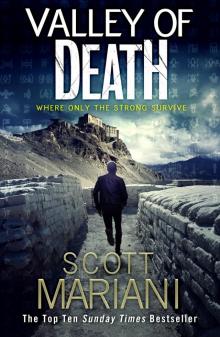 Valley of Death
Valley of Death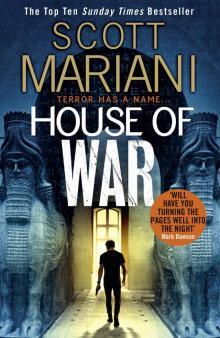 House of War
House of War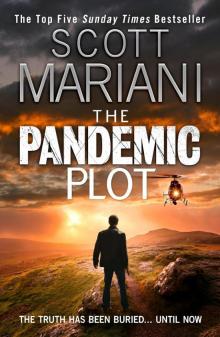 The Pandemic Plot
The Pandemic Plot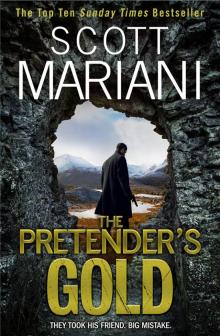 The Pretender's Gold
The Pretender's Gold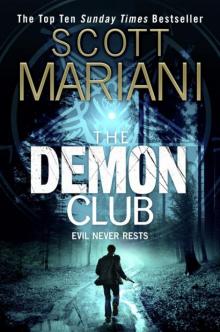 The Demon Club
The Demon Club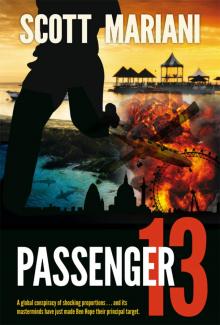 Passenger 13 (Ben Hope eBook originals)
Passenger 13 (Ben Hope eBook originals)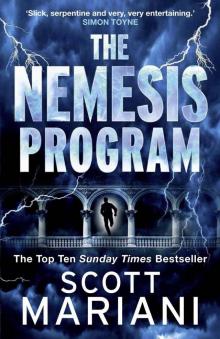 The Nemesis Program_Ben Hope
The Nemesis Program_Ben Hope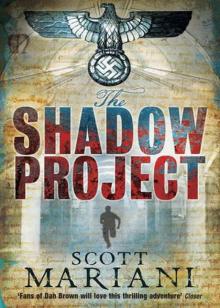 The Shadow Project
The Shadow Project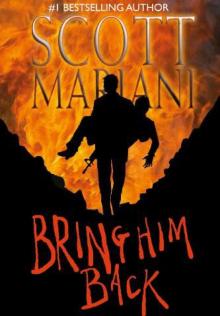 Bring Him Back
Bring Him Back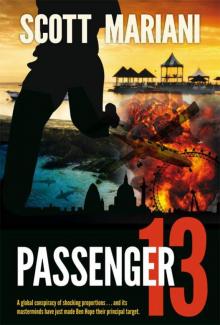 Passenger 13
Passenger 13 Sacred Sword (Ben Hope 7)
Sacred Sword (Ben Hope 7)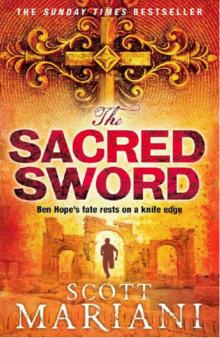 The Sacred Sword (Ben Hope 7)
The Sacred Sword (Ben Hope 7)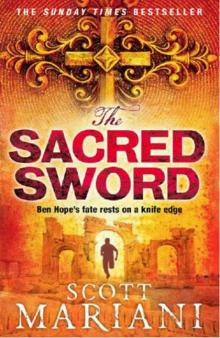 Sacred Sword
Sacred Sword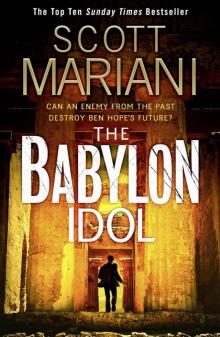 The Babylon Idol
The Babylon Idol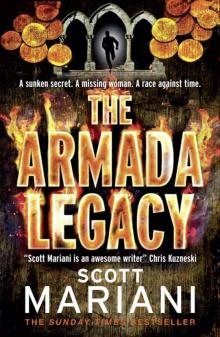 The Armada Legacy
The Armada Legacy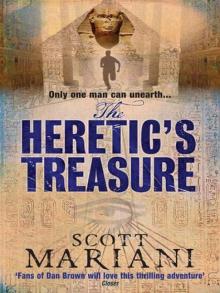 The Heretic's Treasure
The Heretic's Treasure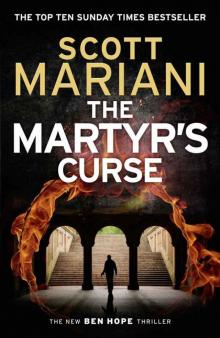 The Martyr’s Curse
The Martyr’s Curse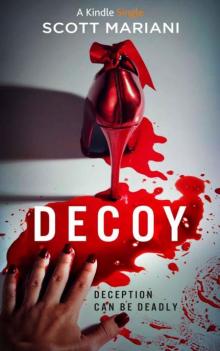 DECOY (Kindle Single)
DECOY (Kindle Single)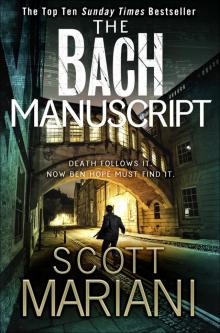 The Bach Manuscript
The Bach Manuscript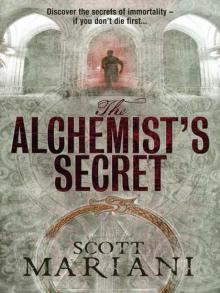 The Alchemist's Secret
The Alchemist's Secret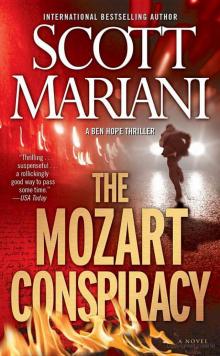 The Mozart Conspiracy: A Novel bh-2
The Mozart Conspiracy: A Novel bh-2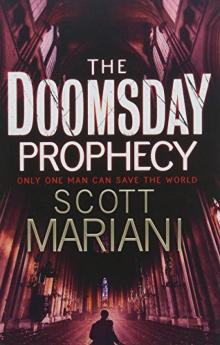 The Doomsday Prophecy
The Doomsday Prophecy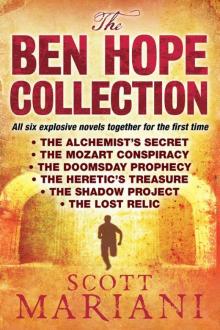 The Ben Hope Collection: 6 BOOK SET
The Ben Hope Collection: 6 BOOK SET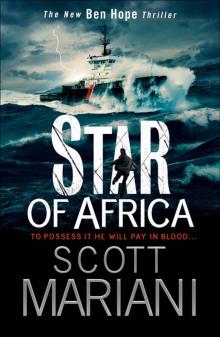 Star of Africa (Ben Hope, Book 13)
Star of Africa (Ben Hope, Book 13)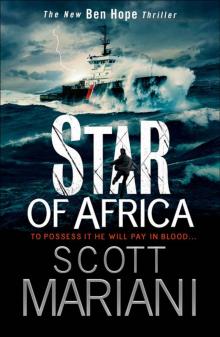 Star of Africa
Star of Africa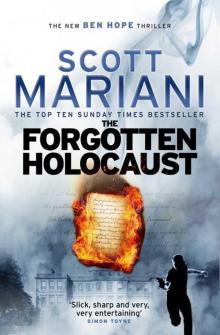 The Forgotten Holocaust (Ben Hope, Book 10)
The Forgotten Holocaust (Ben Hope, Book 10)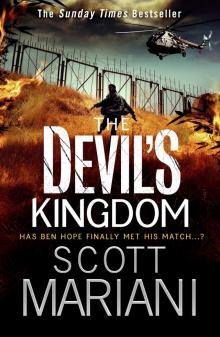 The Devil's Kingdom
The Devil's Kingdom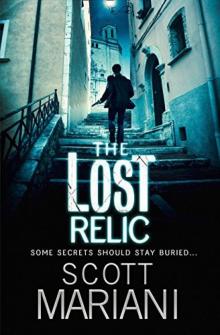 The Lost Relic
The Lost Relic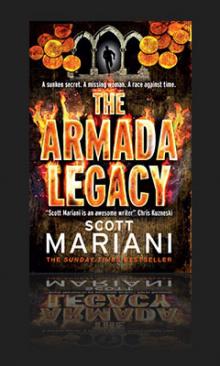 The Armada Legacy bh-8
The Armada Legacy bh-8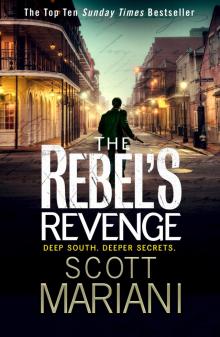 The Rebel's Revenge
The Rebel's Revenge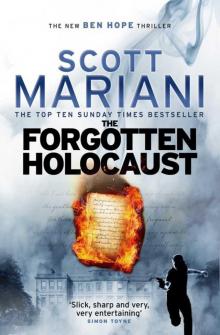 The Forgotten Holocaust
The Forgotten Holocaust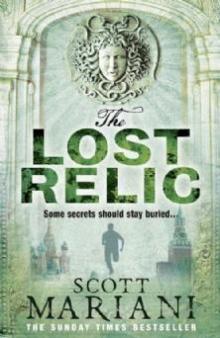 The Lost Relic bh-6
The Lost Relic bh-6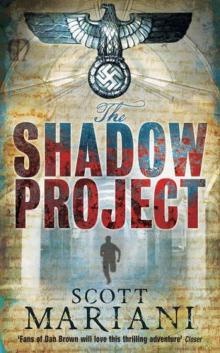 Ben Hope 05 - The Shadow Project
Ben Hope 05 - The Shadow Project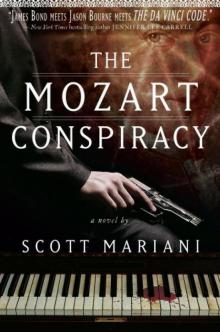 The Mozart Conspiracy
The Mozart Conspiracy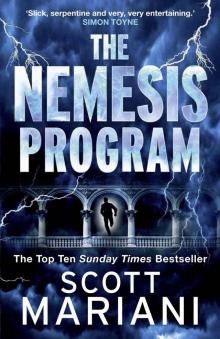 The Nemesis Program
The Nemesis Program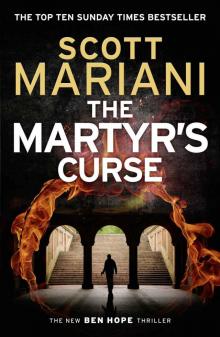 The Martyr’s Curse (Ben Hope, Book 11)
The Martyr’s Curse (Ben Hope, Book 11)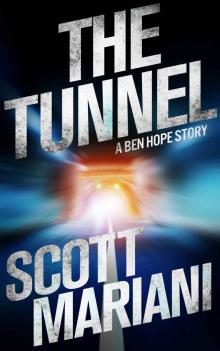 THE TUNNEL: A Ben Hope Story
THE TUNNEL: A Ben Hope Story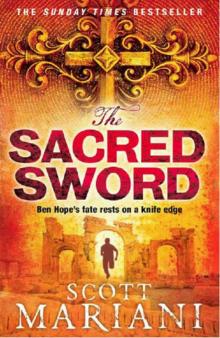 The Sacred Sword bh-7
The Sacred Sword bh-7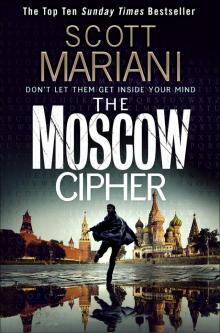 The Moscow Cipher
The Moscow Cipher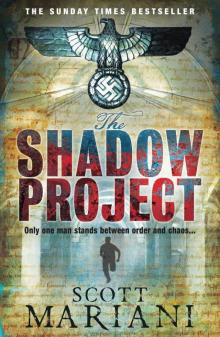 The Shadow Project bh-5
The Shadow Project bh-5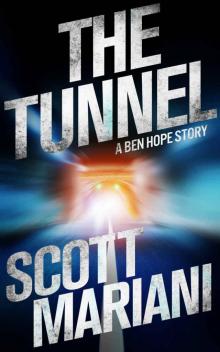 The Tunnel
The Tunnel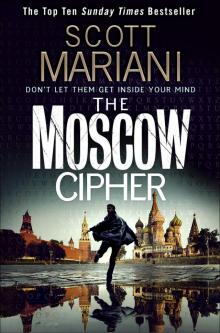 The Moscow Cipher (Ben Hope, Book 17)
The Moscow Cipher (Ben Hope, Book 17)